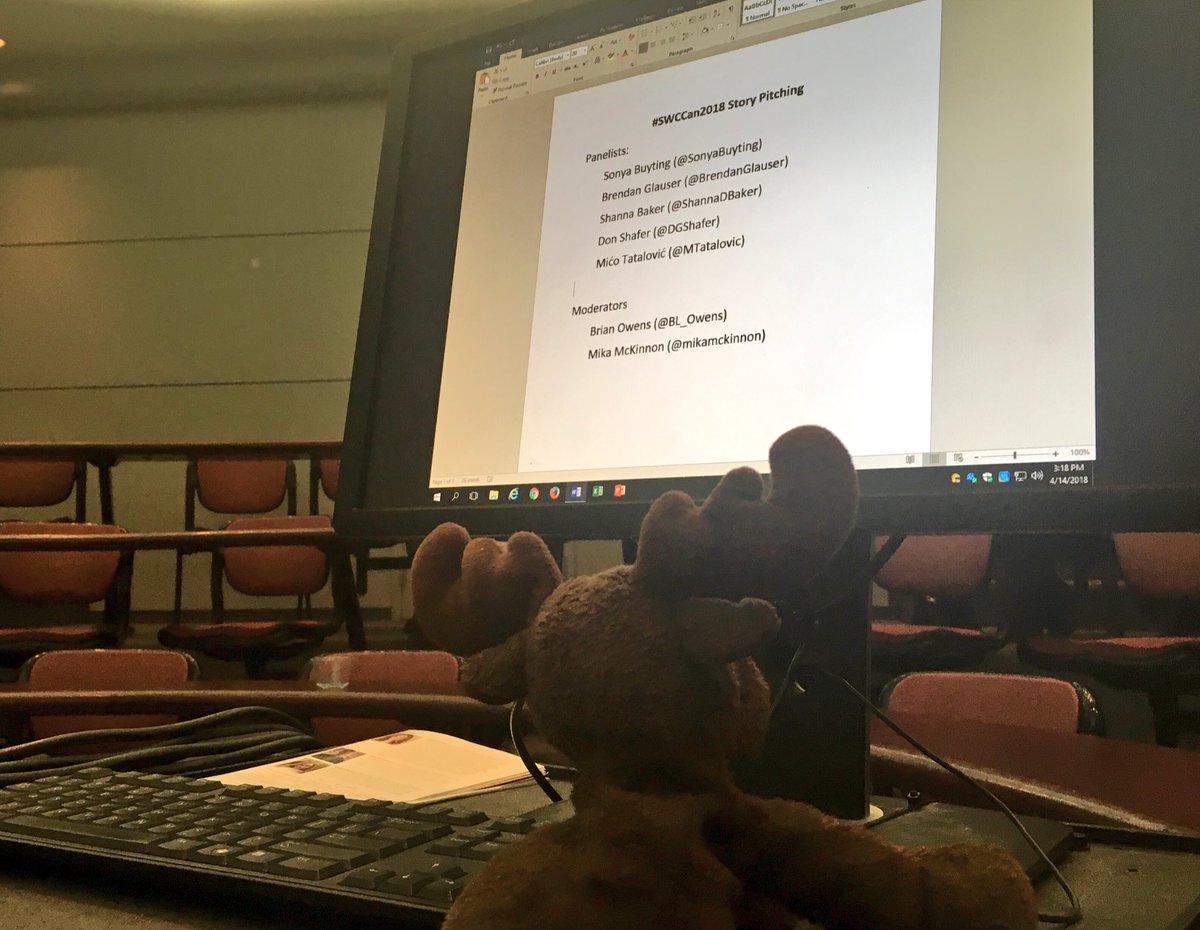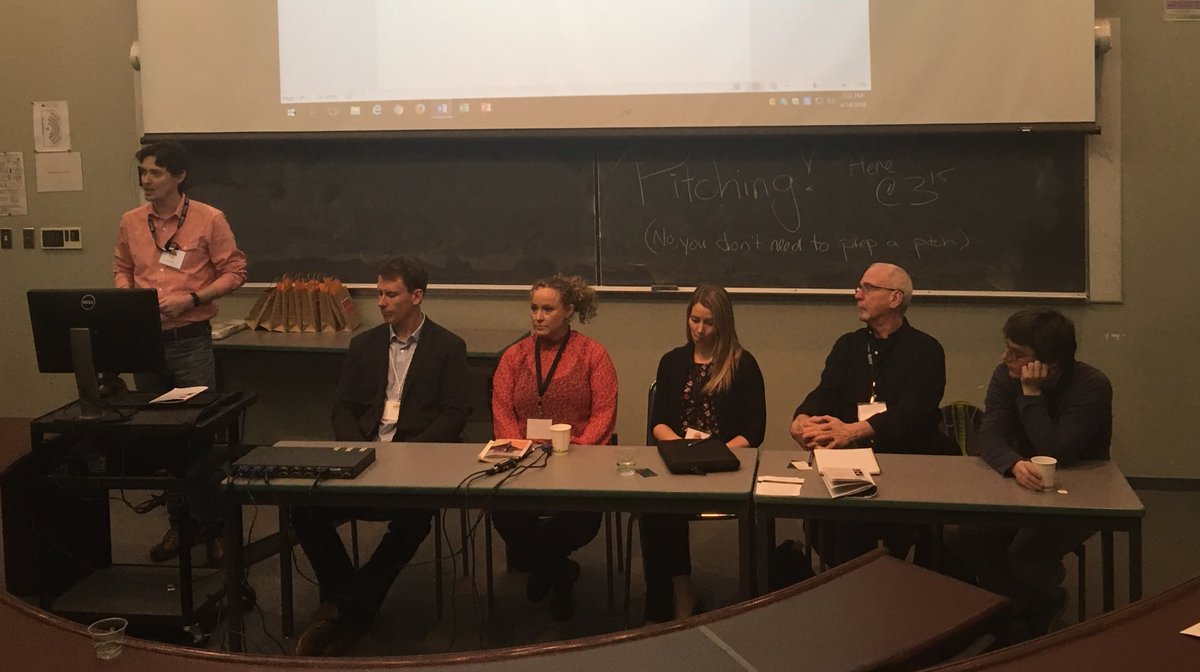#SWCCan2018 3:15 TODAY in room 1600: Join @BL_Owens & I to get expert feedback on pitching from editors @SonyaBuyting @BrendanGlauser @ShannaDBaker Don Shaefer & @MTatalovic!
I’m really excited by the range of experiences we collected for this session:
Buyting is currently radio (Quirks & Quarks), formerly TV
Glauser is currently nonprofits (David Suzuki Foundation), formerly marketing, radio, & TV
Baker is online magazine (Hakai) & photographer
Buyting is currently radio (Quirks & Quarks), formerly TV
Glauser is currently nonprofits (David Suzuki Foundation), formerly marketing, radio, & TV
Baker is online magazine (Hakai) & photographer
Shafer* is community radio (Roundhouse) & researcher in how people communicate climate change.
Tatalović is daily news (freelance), formerly print magazines.
*Misspelled in root tweet, whoops!
Tatalović is daily news (freelance), formerly print magazines.
*Misspelled in root tweet, whoops!
Q: Do I need to have pitches prepped to attend the session?
A: No! This is about HOW to pitch, with a few brave souls pitching in public to get constructive criticism on how to pitch better.
A: No! This is about HOW to pitch, with a few brave souls pitching in public to get constructive criticism on how to pitch better.
#SWCCan2018: Story Pitching up next (3:15) in 1600. LURKING IS FINE, you do NOT need to have pitches prepped to learn!
Moose is so ready for the #SWCCan2018 pitching session with @SonyaBuyting @BrendanGlauser @ShannaDBaker @dgshafer @MTatalovic while @BL_Owens keeps ‘em organized. 



Q: What do you pitch on behalf of a foundation?
@BrendanGlauser: At @DavidSuzukiFDN, it’s mostly responses (to news, policy...) with a bit of original research.
@BrendanGlauser: At @DavidSuzukiFDN, it’s mostly responses (to news, policy...) with a bit of original research.
Q: What makes a good TV story?
@BrendanGlauser: You always, always need to think what the visuals will be.
@BrendanGlauser: You always, always need to think what the visuals will be.
Q: What’re my odds of landing a radio pitch?
Both @SonyaBuyting & @dgshafer agree it’s really tough; almost all stories are developed in-house after internal pitching.
Both @SonyaBuyting & @dgshafer agree it’s really tough; almost all stories are developed in-house after internal pitching.
Q: What type of stories does @CBCQuirks cover?
@ShannaDBaker: Try to cover all major science fields, then a mix of “Oh, wow!”, features, natural history dives, and a scattering of the science of hot buzzy news.
@ShannaDBaker: Try to cover all major science fields, then a mix of “Oh, wow!”, features, natural history dives, and a scattering of the science of hot buzzy news.
Q: What stories does @hakaimagazine love?
@SonyaBuyting: It MUST be coastal with a strong narrative and a strong “So what?” and NO regurgijournalism (things widely covered elsewhere)
@SonyaBuyting: It MUST be coastal with a strong narrative and a strong “So what?” and NO regurgijournalism (things widely covered elsewhere)
A: How do science stories end up on a corporate local radio station like @roundhouse983 that has no dedicated science desk?
@dgshafer Daily news has thousands of radio guests a year following the news cycle (including science). More evergreen content sticks around as podcasts
@dgshafer Daily news has thousands of radio guests a year following the news cycle (including science). More evergreen content sticks around as podcasts
Q: I wanna Pitch @newscientist! How do I up my odds for success?
@MTatalovic Read the publication pitch guidelines (newscientist.com/in209-guide-fo…)! & take advantage of @Open_Notebook’s Pitch database yo learn what NOT to do.
@MTatalovic Read the publication pitch guidelines (newscientist.com/in209-guide-fo…)! & take advantage of @Open_Notebook’s Pitch database yo learn what NOT to do.
Q: What’s what the most important part of pitching news?
@MTatalovic
1. Make sure it’s NEW, especially since print has a lag
2. Make sure it’s a story, not a topic
3. Keep your pitch succinct since the news story will probably be ~400 words
@MTatalovic
1. Make sure it’s NEW, especially since print has a lag
2. Make sure it’s a story, not a topic
3. Keep your pitch succinct since the news story will probably be ~400 words
Q: Anything special that makes the rare radio pitch actually get commissioned?
@SonyaBuyting “Msje it immersive!” Radio is all about the audio with no visual assistance to evoke the story
@SonyaBuyting “Msje it immersive!” Radio is all about the audio with no visual assistance to evoke the story
[pause during sample pitch, but I’ll pick back up with redacted constructive criticism & lessons we can learn from feedback]
Redacted Pitch: There’s a medical controversy which may or may not be science vs pseudoscience.
Our editors want to know:
1. How much impact does it really have?
2. For a big, complicated idea, find one clear story & stay focused (maybe even multiple stories you pitch desperately).
3. Specify the exact points of scientific uncertainty fueling the controversy.
1. How much impact does it really have?
2. For a big, complicated idea, find one clear story & stay focused (maybe even multiple stories you pitch desperately).
3. Specify the exact points of scientific uncertainty fueling the controversy.
4. If you plan to write on X, you NEED to be enough of an expert in X to determine if the controversy is science vs science or science vs pseudoscience. If you don’t know, do your research BEFORE you pitch.
5. Complex controversies are PERFECT for longform audio (big radio blocks, podcasts...) where you can feature many voices playing off each other.
Conversely, for print, make a clear outcome/hero so it’s not a frustrating he said/she said.
Conversely, for print, make a clear outcome/hero so it’s not a frustrating he said/she said.
6. For stories with policy implications (like public health), consider ideal timing! Some stories have natural seasonal hooks — sunburns in summertime, diet in the holidays, etc.
7. RESEARCH THE OUTLET! Target the pitch to their audience, and search their archives to ensure it’s not a repeat.
Redacted Pitch: Why isn’t this medical procedure available?
8. Don’t tease with your setup! If you lead us into why we want X, you can’t end with “And it’s impossible, so nanny nanny foo foo!” Instead, guide into current research, possible future capacity, or viable alternatives
9. Keep the “So what?” clear and central to the pitch
9. Keep the “So what?” clear and central to the pitch
10. The story might not be what you originally thought it was. Be ready to shift your angle & focus to match the story you can tell, not necessarily the idea that first sparked your curiosity.
Q: Can you pitch a story that is JUST about misconceptions?
@SonyaBuyting Yes, debunkers are excellent if it’s highly viral.
@SonyaBuyting Yes, debunkers are excellent if it’s highly viral.
Q: How does conflict of interest come into play when you’re also a science researcher?
@mikamckinnon It’s hugely variable dependent on the outlet. If in danger or in doubt, tell your editor EVERYTHING up front and let them decide.
@mikamckinnon It’s hugely variable dependent on the outlet. If in danger or in doubt, tell your editor EVERYTHING up front and let them decide.
[conflict of interest cont.] @shannaDBaker Haiaki would never allow you to report on your own work, while @ConversationEDU ONLY allows self-reporting
Both @MTatalovic & @sonyabuyting welcome tips from researchers on their research (where they’re a source, not the writer)
Both @MTatalovic & @sonyabuyting welcome tips from researchers on their research (where they’re a source, not the writer)
Related: @bl_owens Some places will give you a Finder’s Fee if you pitch a story you can’t write due to conflicts of interest.
Q: I want to leave OR and go to journalism. Is this total anathema?
@BrendanGlauser No, but avoid (or declare) pitching stories about your former clients.
@BrendanGlauser No, but avoid (or declare) pitching stories about your former clients.
Redacted Pitch: I have a project!
11. What exactly do you want as an outcome of the pitch? What actions are you hoping for (audience, partners, funding...)?
12. Be clear on who you are representing — yourself, an organization, or someone else.
13. News must be new. If it’s old research, it needs a current hook.
12. Be clear on who you are representing — yourself, an organization, or someone else.
13. News must be new. If it’s old research, it needs a current hook.
Proxy question:
External Tweet loading...
If nothing shows, it may have been deleted
by @aerin_j view original on Twitter
For TV...
@SonyaBuyting Turnaround is VERY fast, so be incredibly clear on if it can be accomplished quickly. Segments are VERY short (<7min)
@dgshafer TV budgets & timing is brutal, so if you have a great story you may want to independently produce video & syndicate it.
@SonyaBuyting Turnaround is VERY fast, so be incredibly clear on if it can be accomplished quickly. Segments are VERY short (<7min)
@dgshafer TV budgets & timing is brutal, so if you have a great story you may want to independently produce video & syndicate it.
Redacted Pitch: Cool obscure natural history story with no current news hook
14. You NEED a hook. “What’s happening now?” New research, an anniversary, a new finding, anything!
15. Some publications do retrospectives on their own archives — see who covered it way back when & give an update. (Like still photo documentary videos of newspaper advices)
15. Some publications do retrospectives on their own archives — see who covered it way back when & give an update. (Like still photo documentary videos of newspaper advices)
Question by proxy?
External Tweet loading...
If nothing shows, it may have been deleted
by @aerin_j view original on Twitter
Q: Does it help to have neat audio, video, or photos to pitch stories?
@SonyaBuyting *nodnodnod*
@BL_Owens Cool media can make a “Eh, whatev” story something incredible m
@SonyaBuyting *nodnodnod*
@BL_Owens Cool media can make a “Eh, whatev” story something incredible m
Q: What makes a story worth revisiting with an update?
@MTatalovic News is new. If it’s something surprising o interesting, we update, but not just more same ol’. But, some publications revisit past cutting edge reporting to see what failed to pan out.
@MTatalovic News is new. If it’s something surprising o interesting, we update, but not just more same ol’. But, some publications revisit past cutting edge reporting to see what failed to pan out.
[Revisiting stories cont]
@dgshafer 24-hour dedicated news follows stories as they unfold as long as they’re popular with even tiny updates, but bail the moment popularity drops.
@dgshafer 24-hour dedicated news follows stories as they unfold as long as they’re popular with even tiny updates, but bail the moment popularity drops.
Redacted Pitch: I have an idea that would be really hard to pitch...
16. Try unusual outlets!
17. Publish on your own platform (social media) to build brand and network.
18. Look for other similar work and see where it landed.
17. Publish on your own platform (social media) to build brand and network.
18. Look for other similar work and see where it landed.
4:45 Session ends
4:46 1% battery
Thank you!
4:46 1% battery
Thank you!

• • •
Missing some Tweet in this thread? You can try to
force a refresh




